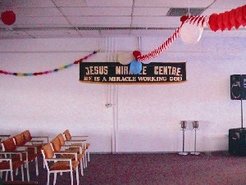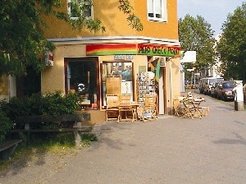Ghanaians in Germany – transnational social fields and social status


Ghana has become one of the major African countries of migration to Western Europe and North America over the last 40 years. Stimulated by economic and social crises from the late 1960s to the end of the 1980s, many Ghanaians left the country to look for better opportunities abroad. Although most Ghanaian migrants live in African countries, during the 1980s and 1990s significant Ghanaian populations emerged in Great Britain, Canada, the USA, Germany, the Netherlands and Italy. Ghanaians make up one of the biggest sub-Saharan African populations in Western Europe (Ter Haar 1998). According to official figures, more than 23 000 people with a Ghanaian passport live in Germany today.1 The great majority of Ghanaians came between the late 1970s and the early 1990s. During this time, Germany was relatively attractive for migrants claiming asylum because of its relatively liberal procedures and its labour opportunities. After 1993 the inflow of Ghanaian migrants was reduced significantly by the restrictive migration policy implemented by the German government. Over the last decade, the large majority of the Ghanaians have secured their legal status. A 'localising process' has started which expresses itself in the form of family foundation, the emergence of afro-shops and Ghanaian initiated churches. Ghanaian migrants' life-worlds with their own institutions have emerged in many larger German cities.
From ‘Brain Drain’ to ‘Diaspora’ – Paradigm shift in the discourse on migration in Ghana
In the 1990s, it was estimated that between 10 and 20 percent of Ghanaian citizens were living abroad (Peil 1995: 365), which would correspond to between two and four million people based on the current size of the Ghanaian population. In particular, it was qualified people such as teachers, engineers, nurses and doctors who left the country, which had a negative impact on its economic and social system. But migration also has a positive effect on Ghanaian society. As in other emigration countries, remittances of and trade relations with migrants have become more and more important for the economic development of Ghana and the well-being of many families. One indicator of the importance of Ghanaian migrants for their homeland is the volume of remittances.
In 2000, it was estimated that the value of remittances came to between $300 and $400 million.2 After cocoa, gold and tourism, remittances are the fourth largest source of foreign exchange.3 The economy of Ghana is dependent on this financial input. The importance of the relatively wealthy migrants in the 'diaspora' and the need to strengthen their attachment to the home country has been recognised by political and social elites in Ghana: the patriotism of Ghanaians abroad should be used as a resource for 'developing' the country. In the context of a policy of inclusion, Ghanaian politicians and some of the so-called traditional authorities have started to travel quite frequently to meet 'their people' abroad. These acts of including the Ghanaians abroad are a symbolic statement: all Ghanaians, in Ghana and abroad, should participate in the 'Ghanaian development project'. In this respect, Ghana has become a deterritorialised nation-state. After independence in 1957, the official political doctrine was that Ghanaians are the people living in Ghana. Now it seems to have been reversed; Ghana is wherever Ghanaians live. The discourse about migration has changed significantly. In the 1980s it was dominated by brain drain. Migrants were officially perceived as people leaving their country in the lurch in difficult times. Additionally, the fact that these migrants were claiming asylum in other countries was perceived as shameful for the country and migration acquired connotations of political opposition. Now, the dominant policy of inclusion is accompanied by a nationalist discourse that regards migration as a possible means of supporting the Ghanaian nation-state project. Migration has changed from being a threat to being a resource for the country.
Paradox of Migration – living in two life-worlds
After Ghanaian independence in 1957, migration to Europe was dominated to a great extent by state-sponsored students. The new state was involved in a 'project of modernity' and the future elite, the 'fortunate few' (Clignet/Foster 1966), were to be educated abroad and to return to take up important positions in society. During the period of economic decline and political crisis in the 1970s and 1980s, migration ceased to be a state undertaking and became an individual attempt to get out of the system. The remittances migrants send home regularly and the cars, money, nice clothes and consumer goods they bring with them on their visits have a clear message: if you want to improve your standard of living and if you want to participate in a symbolic modernity, go abroad.

"To look for greener pastures" is a common expression in Ghana to refer to the act of leaving the country for economic reasons. Migration has become more and more important as a means of status production. The more the local status system is integrated into the global system, both by family members living abroad sending remittances and by the liberalisation of the Ghanaian market, the more individuals have to get involved in the global system in order to maintain or to improve their position in the local status system. Integration into a wider global system is evidenced by the consumer goods sold on the local markets and by visible manifestations of success, like cars, clothes and houses, which are associated with migrants. Going to the global centres is equated in Ghana with a gain of status, which has to be performed at home. To use Goffman's stage metaphor (1990), Europe is the backstage, where you may stop performing social status in order to accumulate money to perform your social status at home, which was itself achieved by travelling to Europe. This leads, in fact, to the consequence that many migrants who are not able to fulfil the expectations of their families do not go home.4 The 'silent collaboration' between migrants and their friends and family members 'at home' reproduces and maintains a social reality in which migration is equated with prosperity and access to global modernity.5 Both sides keep silent about the backstage, the means of image-production.

In Germany Ghanaians experience marginalisation in different ways. Coming to Germany means becoming 'socially coloured'. Most of the Ghanaians in Berlin have problems finding a job fitting their qualification and are forced to take on work which they would not take on in Ghana. Moreover, the asylum procedure through which a large number of the Ghanaians in Germany have gone has produced "spoiled identities" (Goffman 1986). Finally, the language skills of the Ghanaian migrants are devalued. To put it briefly, I would like to argue that we can only understand the "life-world" of migrants if we acknowledge the "simultaneous incorporation" (Glick Schiller/ Fouron 1999: 344) of migrants into two societies and two social status reference systems. The migrants are perceived as socially successful, modern and wealthy in the Ghanaian context and at the same time as backward, poor and marginalized in the German one.
The gaining of status in one context is achieved by a loss of status in the other. This is what I would like to call the 'paradox of migration': living in two status systems with contradictory attributions of prestige at the same time, a condition which is deeply rooted in the process of migration itself. Because the site of status production is not the site of consumption, there is a structural incentive to maintain integration in both systems. Local migrants' organisations with a transnational orientation are of crucial importance for processing the 'paradox of migration'. During my fieldwork I became interested in two kinds of institutions; the churches and the Ghana Union.
Ghanaians in Germany – transnational social fields and social status
Enfolding the Paradox (I): Localising 'Long Distance Nationalism'
The Ghana Union started in Berlin in the 1980s as a support and advocacy organisation for Ghanaians, who were suffering under an increase of police activity against asylum seekers and illegal migrants in Berlin. In the second half of the 1990s the Ghana Union stopped its work, partly because more and more migrants were successful in securing their legal position. When the Ghana Union was re-established in 2001, its orientation was significantly different.
One important reason to reactivate the Union was to provide a contact organisation for the representatives of the Ghanaian nation-state, who became, within the framework of their policy of incorporation, increasingly active among Ghanaian migrants world-wide. The Ghanaian embassy in Germany expressed its wish for an organisation which would be able to link them up with migrants in Berlin. The new government wanted to display its democratic and transparent attitude to the ‘Ghanaian diaspora’. By doing so, it tried to connect the attachment of the migrants to their families and their home-contexts with the interests of the nation-state. The paradoxical status link that bridges the two lifeworlds should become discursively ‘nationalised’. In a time of decreasing development aid, migrants and their remittances are becoming more and more important for the financial well-being of many so-called ‘Economically less Developed Countries’. This is well noticed by the Ghanaian government and transferred into political practices. In Berlin, many migrants are interested in participating in meetings with Ghanaian officials because they are gaining symbolic recognition and promoting migrant specific interests (i.e. customs regulation, double citizenship, etc.). Additionally, by reinforcing their national identity, their individual projects are reintegrated into a collective project of national development. Within this discourse it is possible to overcome the implicit accusation of leaving their country and the people at home in the lurch. Meeting the president or the ambassador conveys the impression that these migrants are well respected people whose project of migration is individually and collectively successful. Inside this transnational social field, the status ascriptions are rearranged in a way which temporarily factors out the described paradox of migration.
Enfolding the Paradox (II): Charismatic Christianity and the Construction of Identity
The denominational structure of Ghanaian-initiated churches in Germany is very heterogeneous. Quantitatively, Charismatic churches are the most important churches among Ghanaians in Berlin. One reason for this is their significance in the context of the construction of identity. Within these churches a strong emphasis is placed on a practical and rhetorical modernist discourse that deals with central experiences of migration, reflects them religiously and empowers the believer to further action. On the one hand, the Charismatic churches stabilise migrants' identities, because they construct a symbolic background against which migrants can experience themselves as 'modern' and 'successful' and communicate this to relevant others.

On the other hand, the empowerment and prosperity discourse of these churches promises to provide believers with the spiritual means to overcome the symbolic, material and legal obstacles to the affirmation of the constructed self-image. The ambivalence of this discourse - caught between the individual claim of participation in a symbolically constituted modernity and the reality of not having achieved this completely - reflects the Ghanaian paradox of migration - being a 'successful migrant-entrepreneur' and a 'marginalised poverty-migrant' at the same time - and promises to overcome it.
Religious and national identities provide possibilities for the construction of self for the migrants, with which they are able to reinterpret themselves in the context of migration. Although these religious and national sets of identities provide "a field of situational identification to an intelligent actor" (Schlee 2000: 5) in everyday life, on an organisational level, Charismatic Christianity competes with national identity discourses under the condition of migration for the same resources (i.e. membership, money, dominance in the local arena). The success of Charismatic Churches among Ghanaian migrants may also be linked to the process of becoming disenchanted with the Ghanaian nation-state as the agent of the development and modernity Ghana has experienced over the last decades.
References
Bundesamt für Statistik. 2002.
Clignet, R. & Foster, P. (1966). The Fortunate Few. Evanston: Northwestern.
Glick Schiller, N. F. & Fouron, G. E. (1999). Terrains of blood and nation: Haitian transnational fields. Ethnic and Racial Studies 22: 340-361.
Goffman, E. (1986 [1963]). Stigma. Notes on the management of spoiled identity. New York: Simon & Schuster.
Goffman, E. (1990 [1959]). The presentation of self in everyday life. London: Anchor.
Peil, M. (1995). Ghanaians Abroad. African Affairs 94: 345-367.
Ter Haar, G. (1998). Halfway to Paradise. Cardiff: Cardiff Academic Press.
Schlee, G. (2000): Collective Identities, Property Relations and Legal Pluralism. Max Planck Institute for Social Anthropology Working Papers, 1. Halle/Saale.
FOOTNOTES in the text
1 Bundesamt für Statistik (2002).
2 Corporate Ghana. The pulse of the Nation (2001), July/August, 9, p.18.
3 In fact the relevance of the migrants is probably even bigger, because not all of the remittances may be covered by the official figures and a large part of what is declared as tourism are migrants returning for home visits.
4 Normally these events are connected with fund-raising activities.
5 It explains also why deportation is such a large social catastrophe. It is not only because people get humiliated or hurt by the violent procedure, but also because they are not able save their face at home
6 Because of the disparities of wages and currencies the migrants in fact are acquiring wealth according to the Ghanaian standard by doing menial jobs in Europe. A secondary school teacher in Ghana, for instance, earns, converted into Euro, about 60 € and he is not perceived as poor.




